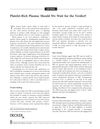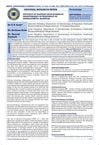 1 citations,
May 2017 in “InTech eBooks”
1 citations,
May 2017 in “InTech eBooks” Some cosmetic procedures show promise for treating hair loss, but more research is needed to confirm their safety and effectiveness.
 70 citations,
February 2017 in “Dermatologic Surgery”
70 citations,
February 2017 in “Dermatologic Surgery” Treatment with plasma rich in growth factors improved hair density and thickness for hair loss patients.
 55 citations,
September 2017 in “Journal of Cosmetic Dermatology”
55 citations,
September 2017 in “Journal of Cosmetic Dermatology” Platelet-rich plasma, taken from a person's own blood, can help rejuvenate skin, stimulate hair growth, and treat hair loss, but more research is needed to confirm its safety and effectiveness.
 12 citations,
May 2019 in “Aesthetic Surgery Journal”
12 citations,
May 2019 in “Aesthetic Surgery Journal” Platelet-Rich Plasma and stem cell therapy can increase hair count and density, but the best method for preparation and treatment still needs to be determined.
 7 citations,
June 2015 in “European Journal of Plastic Surgery”
7 citations,
June 2015 in “European Journal of Plastic Surgery” PRGF treatment safely and effectively helps hair loss.
 3 citations,
December 2019 in “Journal of Cosmetic and Laser Therapy”
3 citations,
December 2019 in “Journal of Cosmetic and Laser Therapy” PRGF treatments increased hair number and thickness in people with hair loss, with more injections leading to better results.
 12 citations,
October 2017 in “Journal of Cosmetic Dermatology”
12 citations,
October 2017 in “Journal of Cosmetic Dermatology” Combining plasma rich in growth factors with hair transplant surgery may lead to faster recovery and better outcomes for hair loss treatment.
 8 citations,
January 2016 in “European Journal of Plastic Surgery”
8 citations,
January 2016 in “European Journal of Plastic Surgery” PRGF treatment is safer and more effective for hair loss than topical minoxidil.
 31 citations,
January 2019 in “Journal of Cutaneous Medicine and Surgery”
31 citations,
January 2019 in “Journal of Cutaneous Medicine and Surgery” Platelet-Rich Plasma (PRP) therapy can promote hair growth and improve facial aesthetics, including reducing acne scars and facial burns, and it works best with three initial monthly injections.
 4 citations,
May 2014 in “Journal of Cutaneous Medicine and Surgery”
4 citations,
May 2014 in “Journal of Cutaneous Medicine and Surgery” Platelet-rich plasma may help with wound healing, hair growth, and skin rejuvenation, but more research is needed to prove its effectiveness.
 39 citations,
June 2013 in “Journal of Cosmetic Dermatology”
39 citations,
June 2013 in “Journal of Cosmetic Dermatology” Herbal extracts and platelet-rich plasma together may help increase hair growth by making certain cells grow more, through specific cell growth pathways.
 29 citations,
January 2018 in “International Journal of Trichology”
29 citations,
January 2018 in “International Journal of Trichology” PRP treatment helps hair growth and density with 70.7% success, but more research needed.
 2 citations,
November 2017 in “Journal of Cosmetic Dermatology”
2 citations,
November 2017 in “Journal of Cosmetic Dermatology” Injecting platelet-rich plasma under the skin significantly improves hair growth and quality without harmful effects.
 May 2024 in “Journal of drug delivery and therapeutics”
May 2024 in “Journal of drug delivery and therapeutics” PRP therapy helps improve hair growth and is safe for treating hair loss.
Combining PRP with a special lotion is more effective for hair loss than PRP alone.
 21 citations,
June 2019 in “Dermatologic Surgery”
21 citations,
June 2019 in “Dermatologic Surgery” Platelet-rich plasma (PRP) treatment has been found effective in promoting hair growth for alopecia patients, with minimal side effects like temporary pain and redness.
 January 2022 in “Tissue & Cell”
January 2022 in “Tissue & Cell” Using both platelet-rich plasma and minoxidil together gives the best results for hair growth in male rats with hair loss.
2 citations,
October 2021 in “Experimental Cell Research” Injectable platelet-rich fibrin helps hair growth by boosting key cell functions.
 May 2023 in “PARIPEX INDIAN JOURNAL OF RESEARCH”
May 2023 in “PARIPEX INDIAN JOURNAL OF RESEARCH” Platelet-rich plasma is an effective and safe treatment for male pattern hair loss.
 October 2020 in “Journal of Aesthetic Nursing”
October 2020 in “Journal of Aesthetic Nursing” Platelet-rich plasma (PRP) injections effectively treat hair loss and thinning in both men and women, with high satisfaction and no major side effects.
 65 citations,
April 2020 in “International Journal of Molecular Sciences”
65 citations,
April 2020 in “International Journal of Molecular Sciences” PRP injections may be a safe, effective alternative for hair loss treatment compared to minoxidil and finasteride.
 31 citations,
April 2018 in “Plastic and Reconstructive Surgery”
31 citations,
April 2018 in “Plastic and Reconstructive Surgery” PRP therapy may improve skin and hair conditions, but more research with standard methods is needed.
 July 2024 in “Quality in Sport”
July 2024 in “Quality in Sport” Combined minoxidil and PRP therapy improves hair growth without affecting physical performance.
 29 citations,
September 2020 in “International Journal of Molecular Sciences”
29 citations,
September 2020 in “International Journal of Molecular Sciences” The document concludes that freeze-dried platelet-rich plasma shows promise for medical use but requires standardization and further research.
18 citations,
January 2019 in “International journal of trichology” The treatment improved hair growth in three patients with alopecia.
 4 citations,
August 2018 in “Facial Plastic Surgery Clinics of North America”
4 citations,
August 2018 in “Facial Plastic Surgery Clinics of North America” Platelet-Rich Plasma (PRP), a protein-rich extract from a patient's blood, shows promise in improving hair density, thickness, and quality, but the best method of use and number of treatments needed for noticeable results are still unclear.
 58 citations,
January 2020 in “International Journal of Molecular Sciences”
58 citations,
January 2020 in “International Journal of Molecular Sciences” Different methods of preparing Platelet-Rich Plasma (PRP) can affect wound healing and hair regrowth in plastic surgery. Using a kit with specific standards helps isolate PRP that meets quality criteria. Non-Activated PRP and Activated PRP have varying effects depending on the tissue and condition treated. For hair regrowth, Non-Activated PRP increased hair density more than Activated PRP. Both treatments improved various aspects of scalp health.
3 citations,
May 2015 in “Journal of archives in military medicine” Platelet-rich plasma (PRP) shows promise in military medicine but its effectiveness varies.
 1 citations,
August 2023 in “International Journal of Molecular Sciences”
1 citations,
August 2023 in “International Journal of Molecular Sciences” Platelet Rich Plasma-Derived Extracellular Vesicles show promise for healing and regeneration but need standardized methods for consistent results.
1 citations,
January 2021 in “Indian Dermatology Online Journal” PRP can help treat hair loss but needs standardized methods for best results.

























